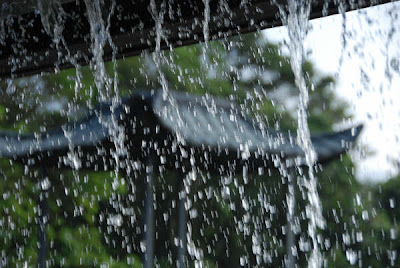.jpg)
In Taiwan, everybody strongly advises not to drink water from the tap. Even boiled water is not enough, as the water is said to contain excessive quantities of heavy metals. Most people here in Taiwan therefore filter water before drinking it, or even drink only bottled water.
But it looks like drinking bottled water is not so environmentally friendly either. Some environmental activists are actually calling to boycott bottled water, which they describe as a far more wasteful product than tap water. Mayors of some cities in the US are urging their citizens to drink water from the tap instead of bottled water.
And so arises my dilemma in Taiwan. On one hand, I would like not to buy bottled water or bottled drinks so often, but on the other hand, I do not completely trust the filtering efficiency of my house tap (since I moved in one year ago, I think we only have changed the filter once!) I sometimes use the fountain at the office but I do not really picture myself carrying liters of mild water from work to home!
On the official website of the Taiwan Water Corporation, it is said that although Taiwan’s rainfall is the triple the global average, only 1/5 of that rainfall is exploited. I am not trying to throw stones but it looks more like a problem of management than a lack of water itself. Furthermore, I have never seen any campaign against wasting water in Taiwan! A Spanish friend living in Taipei indignantly told me that he was surprised by the total absence of rules to avoid wasting water here, when in Spain basic ones like closing the tap while brushing one’s teeth are very common.
On June 26, the WHO published a report entitled Safer water, better health which depicts country-by-country estimations of the burden of disease due to water, sanitation and hygiene. According to this report, dirty water is the cause of 10% of deaths and 6% of illnesses in the world, with strong inequalities between highly developed and less developed countries. The report stresses the importance of clean water but also the fact that investments in drinking-water and sanitation can be highly profitable not only from the health point of view but also from an economical point of view. Its benefits come in several forms, such as healthcare savings, gains in productivity from such things as improvements in school attendance, time savings resulting from more convenient drinking-water and sanitation services etc. Thus, the total return on an annual US$ 11.3 billion investment would be US$ 84 billion per year—that is to say 7 times the initial outlay.
CQFD
But it looks like drinking bottled water is not so environmentally friendly either. Some environmental activists are actually calling to boycott bottled water, which they describe as a far more wasteful product than tap water. Mayors of some cities in the US are urging their citizens to drink water from the tap instead of bottled water.
And so arises my dilemma in Taiwan. On one hand, I would like not to buy bottled water or bottled drinks so often, but on the other hand, I do not completely trust the filtering efficiency of my house tap (since I moved in one year ago, I think we only have changed the filter once!) I sometimes use the fountain at the office but I do not really picture myself carrying liters of mild water from work to home!
On the official website of the Taiwan Water Corporation, it is said that although Taiwan’s rainfall is the triple the global average, only 1/5 of that rainfall is exploited. I am not trying to throw stones but it looks more like a problem of management than a lack of water itself. Furthermore, I have never seen any campaign against wasting water in Taiwan! A Spanish friend living in Taipei indignantly told me that he was surprised by the total absence of rules to avoid wasting water here, when in Spain basic ones like closing the tap while brushing one’s teeth are very common.
On June 26, the WHO published a report entitled Safer water, better health which depicts country-by-country estimations of the burden of disease due to water, sanitation and hygiene. According to this report, dirty water is the cause of 10% of deaths and 6% of illnesses in the world, with strong inequalities between highly developed and less developed countries. The report stresses the importance of clean water but also the fact that investments in drinking-water and sanitation can be highly profitable not only from the health point of view but also from an economical point of view. Its benefits come in several forms, such as healthcare savings, gains in productivity from such things as improvements in school attendance, time savings resulting from more convenient drinking-water and sanitation services etc. Thus, the total return on an annual US$ 11.3 billion investment would be US$ 84 billion per year—that is to say 7 times the initial outlay.
CQFD
Follow the flow:
An interview of Joël Cicéron, director of Veolia Water in Taiwan
China's Water Challenge, a flash presentation by Sabrina Bourouga
Global Challenges of Water Resources, by Michel Camdessus
(Photo by Aurelie Kernaleguen)




